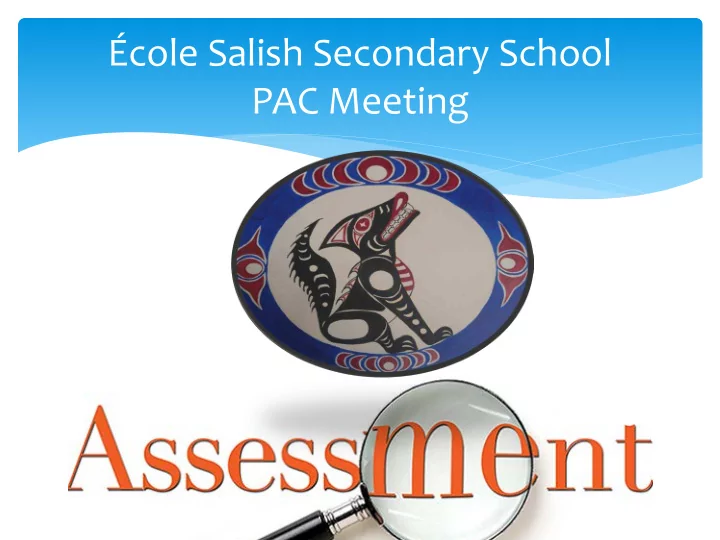

École Salish Secondary School PAC Meeting
Clip
Past Practice ∗ Penalizing 10% a day for late assignments ∗ Not accepting late assignments ∗ Not allowing students to write quizzes if they were late for class ∗ Not giving students chances to demonstrate their learning if they have committed academic dishonesty ∗ Using quizzes, midterms, final exams as classroom management strategies
Assessment & Change
New BC Curriculum & Assessment ∗ Communicates student learning and progress in ways that are meaningful, varied, and responsive ∗ Encourages open dialogue between the learner, home, and school ∗ Focus on conceptual learning (Know-Understand-Do) with an emphasis on competencies
New BC Curriculum & Assessment ∗ Promotes student ownership of learning ∗ Relies on authentic evidence of learning ∗ Establishes consistent , provincial standards
What is the Salish Way? Thoughtful Cohesive Consistent Meaningful
Bins Bins ∗ Homework 20% ∗ Projects 20% ∗ Quizzes 10% ∗ Tests 20% ∗ Midterm 10% ∗ Final Exam 20%
Bins to Learning Standards Bins to…Standards
New Language Arts Curriculum
Learning Standards: Language Arts ∗ 1 Create 25% ∗ 2 Communicate 25% ∗ 3 Comprehend 25% ∗ 4 Connect 25% ∗ No competency is deemed more important than another competency
1. Create ∗ Producing & Developing ∗ “Use writing and design processes to plan, develop, and create engaging and meaningful literary and informational texts for a variety of purposes and audiences” (Ministry)
2. Communicate ∗ Speaking & Expressing ∗ “Exchange ideas and viewpoints to build shared understanding and extend thinking” (Ministry)
3. Comprehend ∗ Knowing & Understanding ∗ “Think critically, creatively, and reflectively to explore ideas within, between & beyond texts ” (Ministry)
4. Connect ∗ Interpreting & Applying ∗ “Synthesize ideas from a variety of sources to build understanding” (Ministry)
Assessing Competencies
What’s the difference? ∗ Jared gets 74% ∗ Amber gets 75% ∗ Nolan gets 76% ∗ How do you distinguish these students’ achievement?
Percentages to Proficiency
Provincial Proficiency Scale
Extending Level Sophisticated (excellent) Understanding/Skills
Proficient Level Complete (very good) Understanding/Skills
Developing Level Partial (good/satisfactory) Understanding/Skills
Emerging Level Initial (minimally acceptable) Understanding/Skills
Not Yet Meeting Level (I) Not Yet (in progress/ incomplete) Understanding/Skills
Letter Grade & Proficiency Scale
Averaging Term 1 = C+ Term 2 = A
Averaging Final Mark
Averaging to Trending Averaging to…Trending
Trending Final Mark
Questions
Assessment vs. Reporting
Student Reporting Policy K-9: Requirements ∗ Minimum 4 points of progress throughout the year; 2 if semester
Student Reporting Policy K-9: Requirements Progress is communicated in relation to the learning standards using the four-point provincial proficiency scale along with descriptive feedback using strength based language At least once , student-selected evidence of and reflection on Core Competency development within a point of progress
Student Reporting Policy K-9: Requirements ∗ Summary of progress Written report of student progress (digital or paper) in relation to learning standards Communication using strength based language which includes descriptive feedback and next steps for learning and the four-point provincial proficiency scale Also includes teacher descriptive feedback on students’ engagement and behaviour (e.g. Personal and social responsibility ) and may include information on ways to support the student at school and at home Student self assessment of all three Core competencies included
Grades 8 & 9 Multiple Terms Marks to Single Term Mark
Grades 8 & 9 Single Term Mark: Requirements ∗ 4 points of progress (Nov., Feb., Apr. & June) ∗ No letter grade ∗ Learning standards ∗ Descriptive feedback ∗ Strength based ∗ Proficiency scale ∗ Letter grade & work habit (June)
Student Reporting Policy Grades 10-12: Requirements ∗ Semester Classes: ∗ Interim Report: self- reflection ∗ Term #1: percentage & work habit ∗ Final: percentage & work habit
Questions
Recommend
More recommend